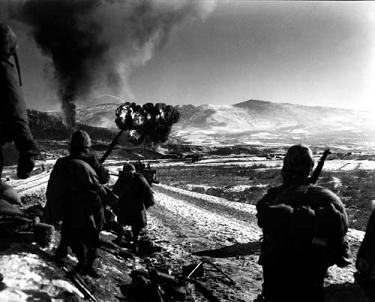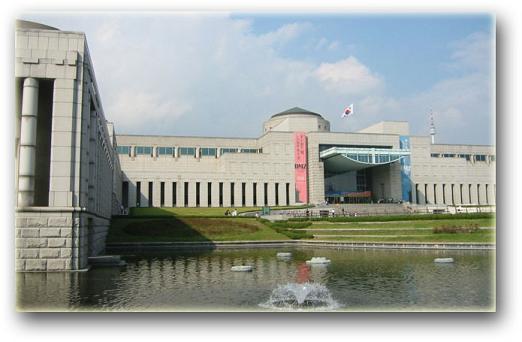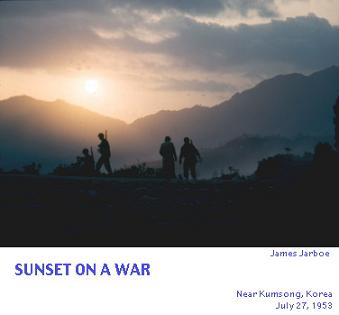
Author: Erin Million
Background information on Chungís family, Korean culture, and the effect of the Korean War on her family:
My dad was in the
war. He was a wounded veteran and until the day he died he had a
bullet in him, nothing life threatening, just a fragment or something.
He told us that during the war he fought side by side a lot of American
soldiers and also the European soldiers. And actually he had a
good opinion, he came away with, saying that all the people w ere
the same. The reason he says that is, he was talking about one
particular incident were he was separated from his troops. Amongst
those separated were some Americans and some Europeans. They were
separated and this was during the cold winter, I mean Korean winters are
very harsh, very cold, and they didnít have any food to eat. I
guess they came to some deserted village or town with just a few houses
and all the people had been evacuated to the Southern portion.
They were looking for food because they were starving because they
hadnít eaten in days. You know, Korean hot sauce that thick pasty
red sauce made out of grounded red peppers, thatís the only thing they
could find and I guess some Kim Chi that some people had buried.
Itís custom to bury it because that way it wonít freeze. And they
found some of that and started eating it and all these American guys
came over and asked if they could have some because they were hungry
too. They were looking at it, because they didnít know, but once the
Korean guys including my dad started eating it they all joined in and
started eating. At least they got something because they were
starving. And he said that when youíre hungry no matter what color
you are you are going to eat whatever is put in front of you. He
did remember them saying how hot it was but they were eating it and
drinking water. Although later he did talk about how they all got
diarrhea. Anyway, so he use to tell us those kinds of stories when
I was young.
ere
the same. The reason he says that is, he was talking about one
particular incident were he was separated from his troops. Amongst
those separated were some Americans and some Europeans. They were
separated and this was during the cold winter, I mean Korean winters are
very harsh, very cold, and they didnít have any food to eat. I
guess they came to some deserted village or town with just a few houses
and all the people had been evacuated to the Southern portion.
They were looking for food because they were starving because they
hadnít eaten in days. You know, Korean hot sauce that thick pasty
red sauce made out of grounded red peppers, thatís the only thing they
could find and I guess some Kim Chi that some people had buried.
Itís custom to bury it because that way it wonít freeze. And they
found some of that and started eating it and all these American guys
came over and asked if they could have some because they were hungry
too. They were looking at it, because they didnít know, but once the
Korean guys including my dad started eating it they all joined in and
started eating. At least they got something because they were
starving. And he said that when youíre hungry no matter what color
you are you are going to eat whatever is put in front of you. He
did remember them saying how hot it was but they were eating it and
drinking water. Although later he did talk about how they all got
diarrhea. Anyway, so he use to tell us those kinds of stories when
I was young.

The Korean War and Chungís fatherís feelings about Americans involvement:
The United States and
other European nations fighting against Japan started liberating
occupied countries, thatís including Korea too. Once the Japanese
surrender they were order to leave Korea. Iím not really familiar with
the whole history but this is what I know of. Listening to my father
and my fatherís friends who are veterans, I donít think that the people
who were actually in the war blame America more than anyone else. I
think they blame more Russia and Red China for backing North Korea to
invade South Korea. I think he doesnít really blame but he wishes some
things were done differently. Hindsight is always 20/20, but when
youíre actually in it and you actually live through it how can you
really know how people came to that conclusion. Maybe, at the time it
was feasible, because that would stop the war, from people getting blown
away and getting killed. You know he died without getting reunited with
his family. He hoped that his mother and sister were still alive. That
was one of his main hopes. The dialogue was very limited between the
North and the South, you can request reunification but unless the North
Korean government who oversees the reunification agrees, you might not
be the one being chosen. I think theyíre very selective as to whose
family they would unite. Of course that is my opinion, because my dadís
request, you know, he never heard anything. He tried many times but I
donít think he ever got any type of response. Maybe partially due to
his political background, I donít know, thatís what Iím thinking. His
family might have all been killed because his family was well to do and
his father was in charged of their village, sort of like a mayor would
be here. Looking back from what my father said they didnít share the
ideologies that the communist had. Thatís why when the communist took
over my grandfather and my fatherís four older brothers were one of the
first people taken away. My father was the youngest of them all, he was
in school, so somehow he escaped.
and getting killed. You know he died without getting reunited with
his family. He hoped that his mother and sister were still alive. That
was one of his main hopes. The dialogue was very limited between the
North and the South, you can request reunification but unless the North
Korean government who oversees the reunification agrees, you might not
be the one being chosen. I think theyíre very selective as to whose
family they would unite. Of course that is my opinion, because my dadís
request, you know, he never heard anything. He tried many times but I
donít think he ever got any type of response. Maybe partially due to
his political background, I donít know, thatís what Iím thinking. His
family might have all been killed because his family was well to do and
his father was in charged of their village, sort of like a mayor would
be here. Looking back from what my father said they didnít share the
ideologies that the communist had. Thatís why when the communist took
over my grandfather and my fatherís four older brothers were one of the
first people taken away. My father was the youngest of them all, he was
in school, so somehow he escaped.